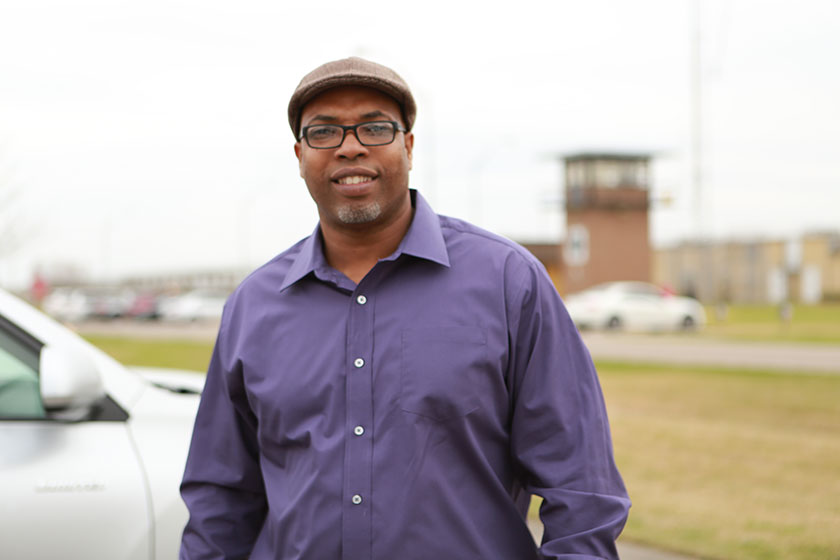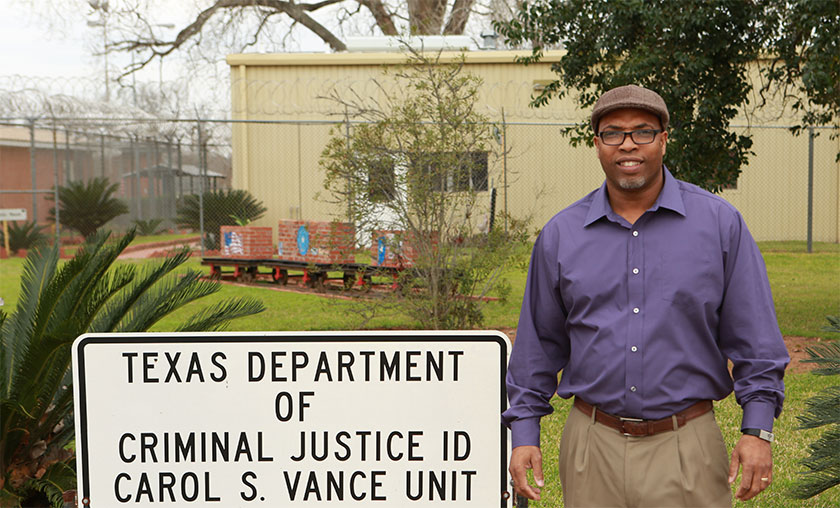The first day Darryl Brooks entered the Prison Fellowship Academy® at the Carol Vance Unit in Richmond, Texas, he was wearing the standard DOC-issued white scrubs. Today, when he walks through the doors, he usually wears khakis and a dress shirt.
It's the typical attire for the director of the program.
SMALL TOWN HIGHS
Crosby, Texas (a town of just a few thousand) wasn't exactly a hotbed of excitement, so Darryl and his buddies learned to create their own. At 10, he started using marijuana, selling it to others by junior high. Dad wasn't around, so Mom worked two jobs to support her 12 children. Darryl was the youngest.
"I was practically raised by my siblings," he explains.
He graduated from high school in 1987, but with no one to help him plan for his future, it was up to him to create it—or try to destroy it.
Darryl still remembers the first time he tried crack cocaine. He and his best friend were cruising the streets of their tiny town, drinking, and his friend handed him his first smoke.
"Anything that was going to take me up, up there, I was gonna try."
After that, he descended deeper into the drug scene, and eventually found himself in court.
'Anything that was going to take me up, up there, I was gonna try.'

'PRISON IS WHAT SAVED MY LIFE'
He was 23 the first time he went to prison, in 1991. Even before that, he had resigned himself to failure.
"I would tell my mom, 'Just let me die in the streets.' But as it turned out, prison is what saved my life."
The first couple of times he got locked up were for short sentences, punctuated by more drug dealing and street life. The third time, he was arrested, the law wasn't as kind. Darryl received a 50-year sentence. He accepted his fate and continued on with the status quo. He even found a way to get his hands on drugs behind bars.
"I lived in prison the way I lived on the streets," he admits.
Meanwhile, his cellmate was pestering him about going to church. "I don't want none of that Jesus stuff," he told him, often ridiculing the man for his faith.
Then one day, five years into his sentence, he woke up.
"I had this epiphany: 'Hey, you doin' the same things in prison that you was doin' on the outside. Ain't nothin' changed.'
He decided to go to attend a church service. About a week later, he found himself at a discipleship class. It was there that, "God wrecked my life and I ain't been the same since."
"Instantly, I started walking the compound and telling people about Jesus Christ."
He stopped dealing drugs and going to church, even though his old associates told him he was crazy.
'I had this epiphany: 'Hey, you doin' the same things in prison that you was doin' on the outside. Ain't nothin' changed.'
TWO-YEAR TURNAROUND
After I got saved, I started living my life for the Lord, but I was still struggling … to figure out how to live life the way God designed me to live.
In 2000, he was transferred to the Carol Vance Unit, so he could participate in the Prison Fellowship Academy. The Prison Fellowship Academy is a holistic life transformation and pre-release program. It was here, through life-skills classes, intensive Bible study, and counseling that the pieces started falling together.
"This program really instilled in me the tools I needed to operate back in society," he said.
For one thing, he discovered what it meant to be a real father. When he went to prison, he had a three-year-old daughter. She was growing up while he was in prison, and Darryl hadn't done much to foster the relationship. But through the help of a parenting class, he began reaching out to his daughter through letters. One year his daughter even came to the prison for a party sponsored by Angel Tree®.
"I always had the desire to be … a dad," Darryl explains. "This program gave me the tools I needed to be a parent."
He also learned the importance of creating limits and boundaries for his relationships and habits—something that many incarcerated people struggle with.
But perhaps the most significant thing the Academy gave him were relationships, the healthy kind.
I saw so many volunteers come through the gate and begin to express the love that I never felt growing up. And that really put the icing on the cake … just those [people] coming in, wrapping their arms around me and saying, 'Hey man, there's a better way to live.'
One of those volunteers, a man named Jim Oliver, became his mentor. Jim met Darryl for the first time at a worship service at Carol Vance, and was stunned when he heard Darryl stand up and pray. Not long afterward, the two men were matched for a mentoring relationship.
When Darryl was released from prison in 2002 (serving less than 11 years on his 50-year sentence), Jim was the one who picked him up and drove him to the parole office. Darryl followed Jim to his church in Sugarland, Texas. And then Jim was a groomsman in Darryl's wedding when Darryl married Rosalind, a woman he had met through another prison volunteer. The couple later asked Jim to be a godparent to their youngest daughter.
"I don't know too many people better than Darryl," says Jim. "He talks the talk and he walks the walk."
'I always had the desire to be a dad. Prison Fellowship Academy gave me the tools I needed to be a parent.'

UNEXPECTED PROMOTION
After Darryl paroled to Houston, he got a job emptying grease trays for a cleaning company for another one of the volunteers he met through the Academy. A year and a half later, he began work as a janitor. In 2004, two years after he was released, he decided to return to Carol Vance—this time as a volunteer.
"Coming back in as a volunteer, coming back through that gate, it was an emotion that I cannot really explain," he says. "Coming back and giving back … it was always a reminder that [being in prison] was what I [didn't] want."
Darryl served as a volunteer for seven years, ministering to and sharing Christ with men who looked a lot like he did a few years earlier. This experience prepared him to come on staff with Prison Fellowship as a program counselor in 2011. And then five years later, in the summer of 2016, Darryl was asked to take the position of director of the entire program. It was an honor he could never have imagined receiving.
Had you told the former drug user and convicted dealer 20 years ago that he would head the very organization that helped him turn his life around, he would have said, "No, not me." But who better to lead the program than one who walked the same corridors, wore the same uniform, and ate the same prison food as those he was serving?
Darryl's is a full-circle story, one that centers around a very faithful God who is using something called Prison Fellowship Academy to rebuild broken lives from the bottom up.
'Darryl talks the talk and he walks the walk.'